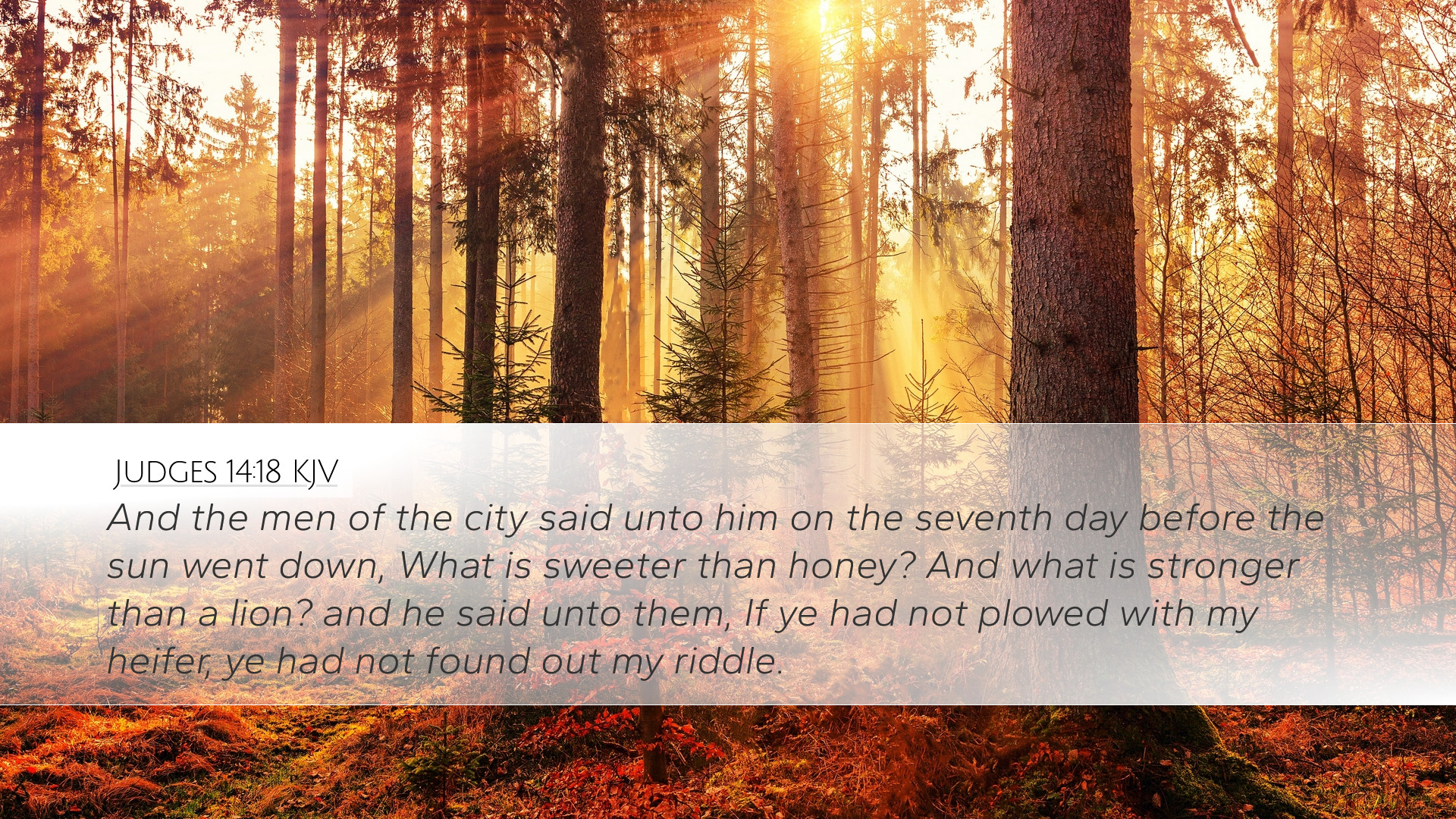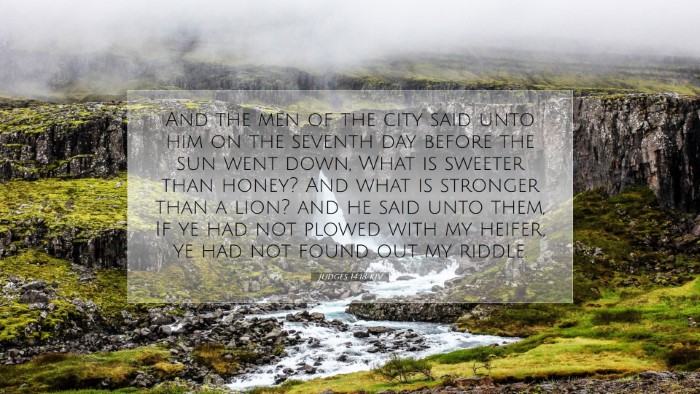Old Testament
Genesis Exodus Leviticus Numbers Deuteronomy Joshua Judges Ruth 1 Samuel 2 Samuel 1 Kings 2 Kings 1 Chronicles 2 Chronicles Ezra Nehemiah Esther Job Psalms Proverbs Ecclesiastes Song of Solomon Isaiah Jeremiah Lamentations Ezekiel Daniel Hosea Joel Amos Obadiah Jonah Micah Nahum Habakkuk Zephaniah Haggai Zechariah MalachiJudges 14:18
Judges 14:18 KJV
And the men of the city said unto him on the seventh day before the sun went down, What is sweeter than honey? And what is stronger than a lion? and he said unto them, If ye had not plowed with my heifer, ye had not found out my riddle.
Judges 14:18 Bible Commentary
Commentary on Judges 14:18
Bible Verse: Judges 14:18 - "And the men of the city said unto him on the seventh day before the sun went down, What is sweeter than honey? and what is stronger than a lion? And he said unto them, If ye had not plowed with my heifer, ye had not found out my riddle."
Contextual Background
The account of Samson in the book of Judges showcases a tumultuous period in Israel's history, marked by a cycle of sin, servitude, supplication, and salvation. Judges 14 illustrates Samson's journey not only as a judge but also as a man struggling with the implications of his choices, particularly regarding his marriage to a Philistine woman. This context is essential to understand the riddle he proposes at the feast, which becomes a focal point for exploring strength and wisdom.
Insights from Matthew Henry
Matthew Henry notes that the riddle posed by Samson encapsulates a profound spiritual truth—it reflects the contrast between human wisdom and divine strength. The sweetness of honey symbolizes pleasures or treasures that man can enjoy, while the lion, king of beasts, represents the might of the Philistines and their oppressive power over Israel.
- Symbolism: Honey signifies delight and earthly pleasures, whereas the lion epitomizes formidable strength and tyranny.
- The Riddle's Meaning: Samson highlights that true understanding comes not from engaging with the enemy (the Philistines) but through the divine strength that sustains and protects.
Insights from Albert Barnes
Albert Barnes suggests that the phrase "If ye had not plowed with my heifer" serves as a metaphor for the deceptive tactics employed by the Philistines to uncover the secret of his riddle. This statement reveals the cunning nature of the adversaries who manipulate circumstances to gain knowledge.
- Deception: Barnes emphasizes that the Philistines' actions illustrate the moral lesson of seeking wisdom through honest means rather than manipulation.
- Divine Wisdom vs. Human Cunning: The riddle exposes the folly of human intellect when it operates outside of God's guidance.
Insights from Adam Clarke
Adam Clarke offers a more theological perspective, focusing on the prophetic nature of Samson's riddle. He suggests that the riddle’s resolution reveals deeper truths about Christ, the 'Lion of the tribe of Judah,' who indeed has power over death (the lion) and offers spiritual sustenance (the honey).
- Typology: Clarke illustrates the type of Christ in Samson, wherein the true answer to the riddle compels believers to recognize the dual nature of God's provision and protection.
- Reflection: The insight is that wisdom and strength come from God, and through Him, believers are equipped to face greater challenges, symbolized by the lion.
Theological Implications
The theological implications of Judges 14:18 extend beyond the narrative itself. This verse serves to illuminate several key themes within biblical literature:
- The Nature of Wisdom: True wisdom aligns with divine revelation rather than human scheming. This reflects the promise found in James 1:5, where believers are encouraged to seek wisdom from God.
- The Power of God: The imagery of honey and lion encapsulates the paradox of life—a blend of sweet and strong experiences that shape the believer’s journey.
- Spiritual Warfare: This verse can also be seen in the context of spiritual warfare, where engaging with worldly tactics leads to compromise, unlike the strength drawn from divine resources.
Practical Applications for Today
The insights gained from Judges 14:18 are relevant for contemporary believers seeking to grow in their understanding and engagement with God’s word:
- Integrity in Communication: Christians are encouraged to communicate truths honestly and avoid deceitful practices, akin to the Philistines' manipulation.
- Seeking God's Guidance: Just as Samson's riddle invited the interpretation of wisdom, believers are reminded to rely on the Holy Spirit for understanding in daily life.
- Recognizing Duality in Life: The juxtaposition of sweetness and strength prompts reflection on God’s provision in both joyous and challenging circumstances.
Conclusion
Judges 14:18 serves as a potent reminder of the biblical themes of strength and wisdom, manifested through interactions that reflect both human folly and divine insight. The commentaries from Henry, Barnes, and Clarke blend to offer a rich tapestry of understanding that speaks to modern-day challenges in faith and character development.


